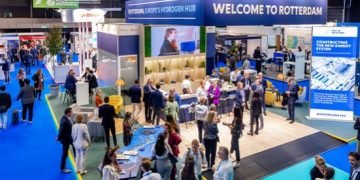By Maria Kalamatas | The Logistic News – World Section
Rotterdam, Netherlands – May 22, 2025
“Hydrogen isn’t just an energy alternative—it’s a logistics revolution in the making.”
— Dutch Minister of Energy, Rotterdam
Building the Backbone of a Global Hydrogen Economy
What began as a climate-focused roundtable quickly evolved into a logistics-driven conversation as more than 20 nations convened this week at the International Hydrogen Summit in Rotterdam. The objective: to align visions, regulations, and investment plans for moving hydrogen across borders at scale.
With port authorities, supply chain executives, and energy ministers sharing the stage, it became clear that hydrogen logistics is now a matter of strategic urgency. As decarbonization deadlines approach, the demand for secure, scalable, and certified hydrogen corridors is intensifying.
Port-Centric Agreements and Strategic Flow Design
Among the most tangible outcomes of the summit were a series of bilateral commitments between exporting and importing nations. These include new joint ventures to develop ammonia-compatible port terminals, secure shipping lanes for hydrogen derivatives, and certification mechanisms that can travel with each molecule from origin to destination.
Countries like Namibia, Chile, and Australia—rich in wind and solar—are aligning with Europe and East Asia to co-create the infrastructure needed to balance production and demand. Rotterdam, already a maritime gateway for energy flows, is positioning itself as the logistical heart of the hydrogen economy.
Logistics Firms Enter a New Phase
While much of the global conversation has centered on generation and storage, this summit shifted attention to the physical movement of hydrogen. From pressurized containers to cryogenic shipping and smart tracking tools, the industry now faces a fresh wave of complexity and opportunity.
Freight companies and port operators must reimagine workflows for flammable, high-volume, and temperature-sensitive cargo. This means new safety protocols, modified storage zones, and tighter coordination between rail, road, and maritime actors.
The Next Frontier for Transport Innovation
Hydrogen isn’t simply a new product to ship—it’s an entire ecosystem to support. And for that, logistics must lead. From Rotterdam’s port leadership to inland freight corridors, participants emphasized the need for dedicated supply chains that don’t just adapt, but evolve in parallel with hydrogen production.
The message from Rotterdam was clear: in the race to decarbonize, the countries that master hydrogen logistics will set the pace.
The Logistic News – World Section
Tracking the tectonic shifts in global trade, energy, and infrastructure.























